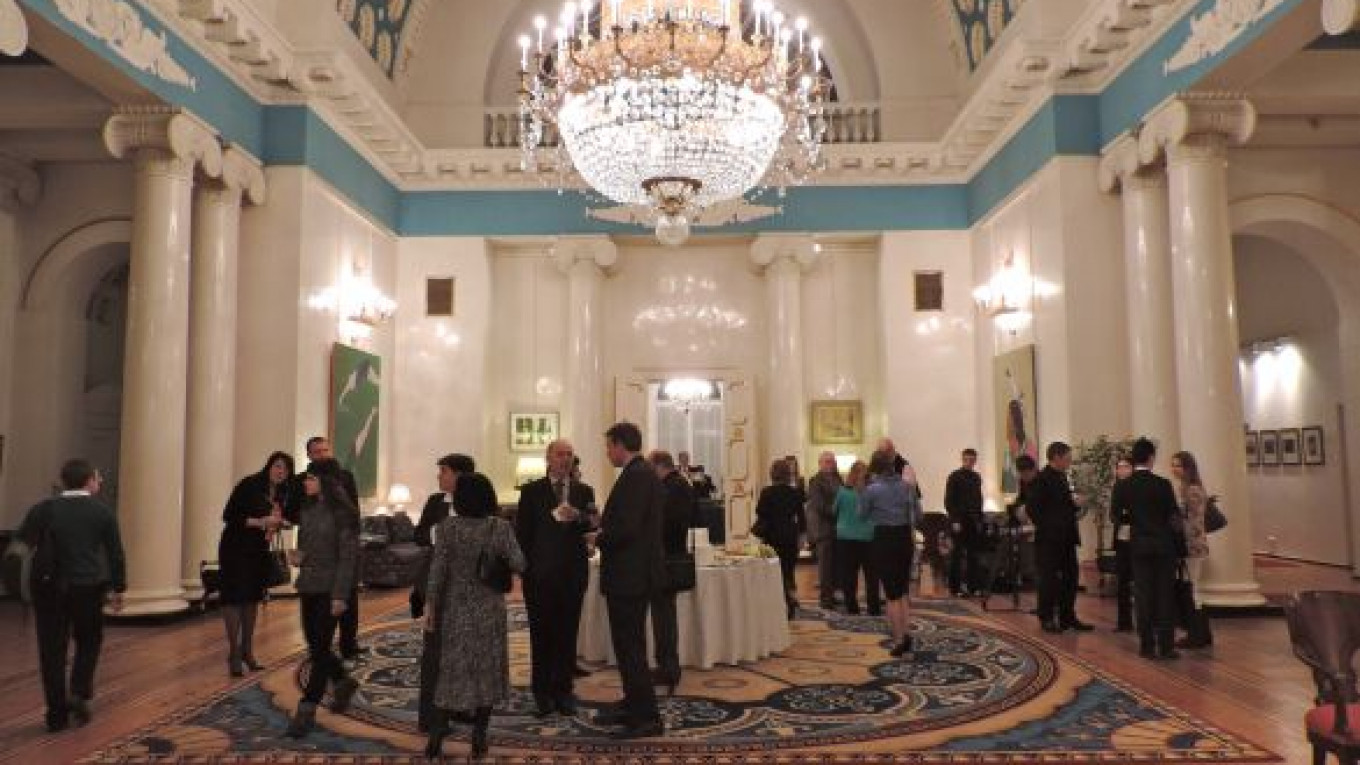Often, the enjoyment of a work of art requires one to forget about its message and simply focus on its sensory appeal. In other cases, the work of art is the message.
The project of cultural diplomacy often straddles this border between agenda and art for art's sake, and at a time when U.S.-Russian relations are publicly frayed, cultural exchange can help to keep tensions at bay. Last week, Grammy Award-winning American saxophonist Bill Evans, a former bandmate of Miles Davis, performed with his band "Soulgrass" at Spaso House, the official residence of the U.S. ambassador.
This concert marked the end of the group's 12-concert tour through Russia. Evans and his rugged clan seemed slightly out of place against the backdrop of blue-white curtains and ornamental columns of Spaso House, but that did not seem to impede the audience's enjoyment of the music itself.
After a brief introduction in Russian from Ambassador McFaul, Soulgrass shook the walls with their unique combination of bluegrass and hard-hitting jazz-fusion, and despite the formal atmosphere, by the end of the concert even the most stoic of Russian feet were tapping. One? young woman even stood up in the aisle and began to sway to the rhythm of the pounding bass. ?
After Evans and his band gave an encore performance of "I Don't Know About Love," a piece from their new album "Dragonfly," the audience left the northern wing and entered the grand hall for the reception, uttering murmurs of satisfaction that were predominantly spoken in English.
While most of the audience seemed satisfied with the performance, a look around the room suggested that events like these were largely decorative, not diplomatic. The crowd was mostly made up of embassy contacts: people in the commerce sector, folks from the NASA Moscow Liaison Office, and executives of Russian branches of large companies like Ford. The impact of cultural exchange in the embassy itself was thus significantly dampened due to the fact that the people watching already had significant exposure to American culture.
However, outside the walls of Spaso House, the U.S. embassy's cultural agenda takes a much more important, if more subtle form. Along with hosting artists at semi-annual private events like the concert on Thursday night, the embassy finances and arranges tours for visiting performers. "On this particular tour we were able to get outside of the major cities, and we were able to meet people that don't normally get the opportunity to meet people like us or hear the kind of music that we play," Evans said during the show. "The U.S. Embassy and the people here made that possible, so that's a good deed." ?
This was not Soulgrass' first time in Russia, but every year the embassy has been expanding their tour, taking the group further and further away from Moscow.? Last year they played in a festival in Sochi, while this year they made their way further afield to cities like Kursk, Bryansk, and Voronezh before heading north to Vladimir and Pskov.? According to Evans, the band encountered a flood of enthusiasm wherever they went, playing every night to sold-out crowds and selling suitcases full of CDs.? He said he was surprised by how fast his merchandise went but was happy to see the impact Soulgrass was having: "We would go out to the doors of the auditorium and greet every single person that left and they were so happy we were there. I think it was good to show that music is something that has no boundaries, you know, it transcends politics. It transcends everything."
Evans' fellow Miles Davis alum, jazz bass legend Marcus Miller, recently played shows in Moscow and St. Petersburg as well. "Relations between the U.S. and Russia aren't fantastic right now, but we're still sold out, you know what I mean? People are coming to make that connection." Miller said about cultural diplomacy "To see that we're human beings, that we care enough to come in and work with them one on one before a show, that's really important."
Supporting musicians is not the only way the U.S. Embassy promotes cultural exchange — Spaso House also recently played host to a reception celebrating the 20th anniversary of FLEX, a program giving gifted youth from the former Soviet Union a chance to study in the U.S. At the reception, former U.S. Senator Bill Bradley, a founder of the program, met with FLEX alumni, many of whom have gone on to have impressive careers in business and government.
Contact the author at artsreporter@imedia.ru
A Message from The Moscow Times:
Dear readers,
We are facing unprecedented challenges. Russia's Prosecutor General's Office has designated The Moscow Times as an "undesirable" organization, criminalizing our work and putting our staff at risk of prosecution. This follows our earlier unjust labeling as a "foreign agent."
These actions are direct attempts to silence independent journalism in Russia. The authorities claim our work "discredits the decisions of the Russian leadership." We see things differently: we strive to provide accurate, unbiased reporting on Russia.
We, the journalists of The Moscow Times, refuse to be silenced. But to continue our work, we need your help.
Your support, no matter how small, makes a world of difference. If you can, please support us monthly starting from just $2. It's quick to set up, and every contribution makes a significant impact.
By supporting The Moscow Times, you're defending open, independent journalism in the face of repression. Thank you for standing with us.
Remind me later.


